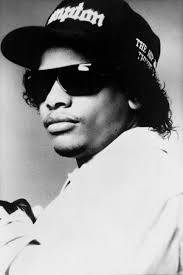Eazy-E, born Eric Lynn Wright on September 7, 1964, in Compton, California, was a pioneering rapper and producer, best known as a founding member of the influential hip-hop group N.W.A. He played a crucial role in popularizing gangsta rap in the late 1980s and early 1990s, with his distinctive delivery, charismatic persona, and willingness to confront social issues through his music. Often referred to as the “Godfather of Gangsta Rap,†Eazy-E left an indelible mark on the hip-hop landscape, paving the way for future generations of artists.
Early Life and Background
Eazy-E was born into a working-class family. His father was a postal worker, and his mother was a schoolteacher, providing a stable but humble upbringing. Eazy attended Compton’s schools, where he was a bright student, but he eventually dropped out of high school in the 10th grade. He became involved in street life, selling drugs to support himself and his family.
Despite his involvement in illegal activities, Eazy-E maintained a passion for music. He was inspired by the burgeoning hip-hop scene in Los Angeles and began rapping in the early 1980s. He would later describe himself as an outsider in the rap community, which fueled his desire to carve out a unique path in the industry.
Formation of N.W.A and Rise to Fame
In the mid-1980s, Eazy-E teamed up with fellow rappers Dr. Dre, Ice Cube, DJ Yella, and MC Ren to form N.W.A (Niggaz Wit Attitudes). The group was a collective of talented artists who sought to bring the realities of street life in Los Angeles to the forefront of hip-hop. Eazy-E’s charisma and distinctive voice quickly made him the face of the group.
N.W.A released their debut album, Straight Outta Compton, in 1988. The album was groundbreaking, featuring raw and explicit lyrics that addressed themes of police brutality, gang violence, and life in the inner city. Eazy-E’s standout track, “Boyz-n-the-Hood,†showcased his unique storytelling ability and became a defining anthem of gangsta rap. The album achieved significant commercial success, going multi-platinum and establishing N.W.A as a dominant force in hip-hop.
The group’s provocative content drew both critical acclaim and controversy, with their lyrics sparking debates about freedom of speech and the portrayal of African American life in music. Eazy-E’s fearless approach and unapologetic attitude resonated with fans, helping to solidify his status as a hip-hop icon.
Solo Career and Continued Success
In 1992, following tensions within N.W.A and the departure of key members like Ice Cube, Eazy-E launched his solo career. His debut album, Eazy-Duz-It, was released that same year and featured hits like “Eazy-Er Said Than Dunn†and “We Want Eazy.†The album further showcased Eazy’s distinctive style and solidified his position as a prominent solo artist.
Eazy-E founded his own label, Ruthless Records, which became instrumental in promoting emerging hip-hop talent. The label signed several artists, including Bone Thugs-N-Harmony, whose unique blend of rap and harmonies gained popularity in the mid-1990s. Eazy’s support helped them achieve critical and commercial success, leading to a successful collaboration on their album E. 1999 Eternal, which featured the hit single “Tha Crossroads,†a tribute to deceased friends.
Health Issues and Death
Despite his success, Eazy-E faced personal challenges. His lifestyle, marked by heavy partying and health risks, took a toll on his well-being. In early 1995, he began experiencing health issues that led him to seek medical attention. He was diagnosed with AIDS, a revelation that shocked the music industry and his fans.
Eazy-E publicly announced his diagnosis in a press conference in March 1995, becoming one of the first high-profile figures in hip-hop to speak openly about the disease. He used his platform to raise awareness about HIV/AIDS and to emphasize the importance of safe sex, particularly within the African American community. His bravery in confronting this issue garnered both support and admiration from fans and peers alike.
Eazy-E passed away on March 26, 1995, at the age of 30. His death marked a significant loss for the hip-hop community, as he had become an influential figure and a pioneer of a genre that continues to evolve.
Legacy and Cultural Impact
Eazy-E’s contributions to hip-hop extend beyond his music. He was instrumental in bringing the West Coast sound to mainstream audiences and in establishing gangsta rap as a legitimate genre. His work with N.W.A set the stage for countless artists who followed, shaping the landscape of hip-hop in the years to come.
Eazy-E’s influence can be seen in the works of numerous artists who cite him as an inspiration. His impact on the genre is acknowledged through various honors, including his posthumous induction into the Rock and Roll Hall of Fame as a member of N.W.A in 2016.
In addition to his musical legacy, Eazy-E’s life story has been portrayed in various media, including the biopic Straight Outta Compton (2015), which chronicled the rise of N.W.A and highlighted his role in the group’s success. The film reintroduced Eazy-E’s story to a new generation, ensuring that his contributions to music and culture are remembered.
Conclusion
Eazy-E remains a seminal figure in the history of hip-hop, known for his groundbreaking work with N.W.A and his contributions as a solo artist. His distinctive voice, fearless lyrics, and commitment to authenticity have left a lasting legacy in the music industry. As a pioneer of gangsta rap and an advocate for HIV/AIDS awareness, Eazy-E’s influence continues to resonate, ensuring that his story and impact endure in the cultural consciousness of hip-hop and beyond.




No comments yet
Be the first to share your thoughts!